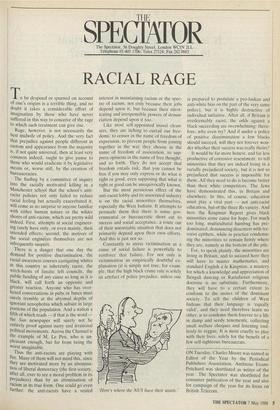SPECT NE AT OR
The Spectator, 56 Doughty Street, London WC1N 2LL Telephone 01-405 1706; Telex 27124; Fax 242 0603
RACIAL RAGE
To be despised or spurned on account of one's origins is a terrible thing, and no doubt it takes a considerable effort of imagination , by those who have never suffered in this way to conceive of the rage to which such treatment can give rise.
Rage, however, is not necessarily the best midwife of policy. And the very fact that prejudice against people different in custom and appearance from the majority IS, if not quite universal, then at least very common indeed, ought to give pause to those who would eradicate it by legislative means or, worse still, by the creation of bureaucracies.
The finding by a committee of inquiry into the racially motivated killing in a Manchester school that the school's anti- racist policies not only failed to reduce racial feeling but actually exacerbated it, will come as no surprise to anyone familiar With either human nature or the wilder shores of anti-racism, which are pretty wild indeed. First, attempts at social engineer- ing rarely have only, or even mainly, their intended effects; second, the motives of the social engineers themselves are not infrequently suspect.
There is a danger that one day the demand, for positive discrimination, the racial awareness courses castigating whites in this country as inherently, racist, the witch-hunts of lunatic left councils, the Public funding of any cause so long as it is black, will call forth an opposite and greater reaction. Anyone who has over- heard conversations in pubs or buses must surely tremble at the abysmal depths of ignorant xenophobia which subsist in large Portions of the population. And a nation a fifth of which reads — if that is the word — the Sun newspaper will surely not be entirely proof against nasty and irrational Political movements. Across the Channel is the example of M. Le Pen, who is un- pleasant enough, but far from being the worst imaginable. Thus the anti-racists are playing with fire. Many of them will not mind this, since they are motivated more by an abomina- tion of liberal democracy (the first society, after all, ever to see a moral problem in its Prejudices) than by an abomination of racism in its true form. One could go even further: the anti-racists have a vested interest in maintaining racism or the spec- tre of racism, not only because their jobs depend upon it, but because their intox- icating and irresponsible powers of denun- ciation depend upon it too.
Like most self-appointed moral clean- sers, they are itching to curtail our free- doms: to censor in the name of freedom of expression, to prevent people from joining together in the way they choose in the name of freedom of association, to sup- press opinions in the name of free thought, and so forth. They do not accept that freedom entails risk, that you cannot be free if you may only express or do what is right or good, even supposing that what is right or good can be unequivocally known.
But the most pernicious effect of the anti-racist lobby and its associated industry is on the racial minorities themselves, especially the West Indians. It attempts to persuade them that there is some gov- ernmental or bureaucratic short cut to success and social acceptance, a route out of their unenviable situation that does not primarily depend upon their own efforts. And this is just not so.
Constantly to stress victimisation as a cause of social failure is powerfully to reinforce that failure. For not only is victimisation an empirically doubtful ex- planation (it is simply not true, for exam- ple, that the high black crime rate is solely an artefact of police prejudice, unless one 'Here's where the NUS have their assets.' is prepared to postulate a pro-Indian and anti-white bias on the part of the very same police), but it is highly destructive of individual initiative. After all, if Britain is irredeemably racist, the odds against a black succeeding are overwhelming: there- fore, why even try? And if under a policy of positive discrimination a few blacks should succeed, will they not forever won- der whether their success was really theirs?
It would be far more honest, and far less productive of corrosive resentment, to tell minorities that they are indeed living in a racially prejudiced society, but it is not so prejudiced that success is impossible for them. All they need to do is become better than their white competitors. The Jews have demonstrated this, in Britain and elsewhere. In this, of course, education must play a vital part — not anti-racist education, but of the three Rs variety. And here the Kingman Report gives black minorities some cause for hope. For much too long, multicultural humbug has pre- dominated, denouncing dissenters with ter- rorist epithets, while in practice condemn- ing the minorities to remain firmly where they are, namely at the bottom of the pile.
For, to speak plainly, the minorities are living in Britain, and to succeed here they will have to master mathematics, and standard English a la Kingman, a mastery for which a knowledge and appreciation of Bengali dancing or Rastafarian religious doctrine is no substitute. Furthermore, they will have to a certain extent to conform to the mores of the dominant society. To tell the children of West Indians that their language is 'equally valid', and they need therefore learn no other, is to condemn them forever tO a life in damp and seedy tenements, collecting small welfare cheques and listening end- lessly to reggae. It is most cruelly to play with their lives, solely for the benefit of a few self-righteous bureaucrats.






















































 Previous page
Previous page